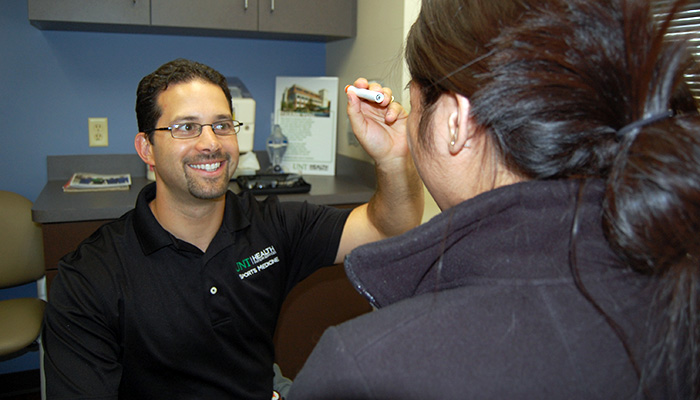Reducing the risks of concussions
By Alex Branch
More children will run onto soccer fields this spring with instructions not to head the ball – a change that a Health Science Center sports medicine physician calls a wise step toward reducing concussions.
The United States Soccer Federation announced new safety guidelines last month that prohibit players age 10 and younger from heading the ball. The guidelines also limit headers in practice for ages 11 to 13.
The regulations – resulting from a class-action lawsuit alleging negligence in treatment of players’ head injuries – are mandatory for U.S. Soccer youth national teams and academies. For other associations and programs, they are only recommendations.
“Those of us in the sports medicine field have been on board with guidelines like these for years,” Daniel Clearfield, DO, a certified sports medicine and concussion specialist at the Health Science Center. “At the youth level, it definitely has the potential to reduce the risk of concussions on the field.”
Dr. Clearfield, who has served as a volunteer sports medicine physician at the U.S. Olympic Training Center in Colorado Springs, said youths’ brains are still developing and are suspended in their heads in a way that leaves more potential to “slosh around” and become concussed.
Youths also lack the neck and core strength to properly strike the ball with their heads, he said.
“To head the ball properly you use your core muscles to distribute the energy throughout your body, not just smack it so your head absorbs the impact,” Dr. Clearfield said. “But young people have weaker necks and often lack the muscular development to distribute the energy.”
The potential cumulative effects of heading the ball also is a concern, Dr. Clearfield said. Organized sports such as football have started focusing on the impact of sub-concussive blows, or microdamage. This can occur during repetitive head impacts that do not cause a concussion, but can still potentially cause long-term changes to the brain’s function.
These sub-concussive blows also can occur when players head a soccer ball, he said.
“It’s like if you get a stress fracture while running,” Dr. Clearfield said. “It is not a full-blown fracture, but if you keep running on it, it will turn into a full-blown fracture. If you keep getting sub-concussions, it can turn into a concussion or other long-term brain injury.”
Just like Pop Warner football leagues are teaching new tackling techniques to youths to avoid head injuries, youth soccer leagues are doing the same with heading guidelines, he said.
“From a child’s developmental standpoint, this just makes sense,” he said.





Social media